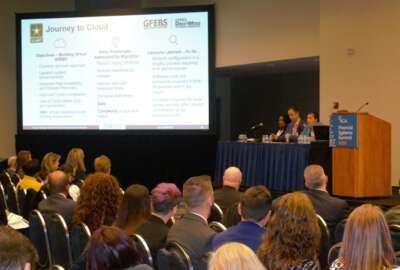
New year, new ways for scammers to impersonate federal agencies
In today's Federal Newscast, fraudsters expanded their tactics to kick off 2020 and the Social Security Administration continues to be a top target.
To listen to the Federal Newscast on your phone or mobile device, subscribe in PodcastOne or Apple Podcasts. The best listening experience on desktop can be found using Chrome, Firefox or Safari.
- Scammers expanded their tactics to kick off 2020 and the Social Security Administration continues to be a top target. SSA’s inspector general is warning of a new scam where bad actors are not only calling citizens, but sending fake emails and letters on SSA letterhead. The IG said it has received several phone calls detailing this new threat. SSA reminded citizens the agency will never threaten them, require payments in a retail gift card or wire transfer or send official letters with personal information. (Social Security Administration Office of Inspector General)
- December was a quiet month for federal employees filing for retirement. Just 5,200 federal employees retired last month. The Office of Personnel Management was able to drop its backlog of pending retirement claims in December. The backlog sat at its lowest point of 2019, with just under 17,000 pending claims. But it’s taking OPM longer to process retirement applications. The average claim took 62 days to handle, the longest since November 2018. (Federal News Network)
- There’s a new online database of agency collective bargaining agreements. Most of these documents were already public. But the new portal is the only place where agency labor relations specialists and members of the public can search through union agreements in one place. It was a requirement of the President’s May 2018 workforce executive orders. The database was a requirement of the president’s May 2018 executive orders on official time, collective bargaining and employee firing. The database lists 774 different agreements to date. (Federal News Network)
- The Trump administration is planning to launch agility training for federal managers this year. The goal is to help managers more quickly respond to change and other complex problems. The training is a priority under the administration’s Presidential Management Agenda. Scaling up existing reskilling and upskilling pilots and expanding a recent hiring initiative are also top items on the administration’s agenda for the federal workforce. (Federal News Network)
- Paul Ray, the acting director of the White House’s Office of Information and Regulatory Affairs, is now the permanent pick for the job. The Senate approved his nomination. Ray has served as acting OIRA director since June 2018, and has overseen the rollout of President Donald Trump’s “two for one” executive order on regulations. Within the first year of the rule, agencies had repealed as many as 22 outdates regulations for every new one they proposed.
- Just weeks away from the start of this year’s tax filing season, leaders of the House Ways and Means Committee have called on Treasury Secretary Steve Mnuchin to name a new National Taxpayer Advocate. Committee Chairman Richard Neal (D-Mass.) and Oversight Subcommittee Chairman John Lewis (D-Ga.) said this marks the first season in more than 20 years that will begin without a permanent pick. Former National Taxpayer Advocate Nina Olson stepped down this summer after holding the job for more than 15 years. (House Ways and Means Committee)
- The State Department took a fresh swipe at Chinese suppliers of 5G wireless technology. In reviewing its cybersecurity and 5G activities, an Economics Bureau spokesman called the notion that without Chinese suppliers, 5G would be set back, absolutely false. He referred to a release from Nokia that that company had inked some 60 commercial 5G deployments. State warns developing countries that deal with Chinese 5G companies come with strings, like long-term debt and loss of control over their data. (Department of State)
- The Justice Department continued to take a lighter touch in going after government contractors. DOJ once again won more than $3 billion in settlements and judgments under the False Claims Act in 2019. But the amount coming from federal procurement fraud continued to be only a small part of those recoveries for a second year in a row. DOJ said that of the more than $3 billion, $2.6 billion came from healthcare cases. Procurement fraud brought in more than $267 million last year. DOJ said under the qui tam provisions of the False Claims Act, whistleblowers received $265 million in 2019, down from $301 million in 2018. (Department of Justice)
- The Navy is implementing its first widespread change to civilian human capital in 10 years. The service’s new strategy puts an emphasis on hiring the most talented workforce, creating a top-notch working environment and using data and technology to assist employees. Civilians make up 29% of the Navy workforce. The Navy said it needs to change the way it approaches the workforce to ensure it hires the best people. The service will start pilot programs aimed at spurring change within the next six months. (Federal News Network)
- Navy officers now have a chance to earn civilian licenses and certifications while they are serving. The service is starting an initial limited funding pilot, which will allow officers to request money for credentialing opportunities on a first come-first served basis. Other military services are providing similar programs in hopes that troops will get experience and licenses they need to gain employment once they leave the military. (Navy)
- The Army’s General Fund Enterprise Business System will complete migration to a commercial cloud next fiscal year, as part of a modernization agenda that includes agile transformation and shared services. The system, allows the service to share financial data with the Treasury Department and the Office of Management and Budget. The Army has also launched a pilot to provide financial management systems as a shared service to the Defense Health Agency and the Navy’s Bureau of Medicine and Surgery. (Federal News Network)
- The Department of Veterans Affairs will take another shot at moving to a consolidated financial management system this summer. Avie Snow, the VA’s associate deputy assistant secretary for financial business operations, said the agency’s first customer will be the National Cemeteries Commission, and will go live with the new system in July. The agency has attempted a financial management business transformation twice before, in 2006 and 1998, but both efforts were unsuccessful. The VA also partnered with the Agriculture Department in 2016 on a financial management shared services agreement, but USDA canceled the agreement a year later. (Federal News Network)
- Court decisions are clearing the way for the Trump Administration to divert $3.6 billion in military construction spending for the president’s proposed border wall. On Wednesday, the Fifth Circuit Court of Appeals lifted a stay that had been blocking the administration from redirecting DoD funds to build the wall. A day later, a district court judge lifted a separate order that barred construction of a privately-funded section of wall in south Texas. The appeals court ruling lets the administration move ahead with 11 projects in California, Arizona, New Mexico and Texas. (Federal News Network)
Copyright © 2025 Federal News Network. All rights reserved. This website is not intended for users located within the European Economic Area.
Eric White
Eric White is news anchor and Federal Drive producer at Federal News Network.
Follow @FEDERALNEWSCAST
Related Stories
U.S. Army PEO EIS/Facebook

Army, VA taking on major enterprise financial system transformation projects
Related Topics
All News
border wall
collective bargaining
credential and access management
Cybersecurity
Defense Health Agency
Federal Drive
Federal Newscast
financial management shared services
fraud
General Fund Enterprise Business System
human capital
Justice Department
National Taxpayer Advocate
office of information and regulatory affairs
Paul Ray
reskilling
Social Security Administration
State Department
Technology




